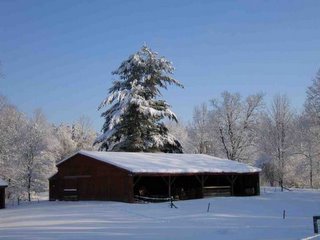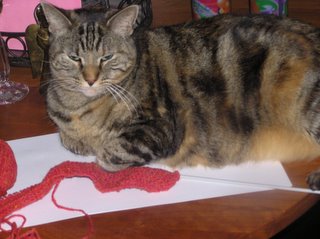For Kristy...
It's hard to pick what to write about growing up on a farm, as it all seems so common and boring to me. Twenty baby lambs being born in a two-week period? What a pain, it meant that I didn’t get much sleep and froze my toes off while standing around waiting for the mothers to get their acts together and start nursing their babies. Shearing time in the spring? An entire weekend devoted to hauling greasy fleeces around the barn and tying them up in old sheets. But I guess I’ll start with a general overview, and now that I’ve started thinking about my childhood there will probably be more in depth pieces to come.
To clarify, while ours was a working farm, and sometimes even a profit-making farm, it never made enough money to support two children who went to private schools. To keep us in clothes, food and tuition money, my mother also wore the hats of an English teacher and tutor for most of my childhood. My parents divorced not long after the purchase of the farm, so the responsibility for its upkeep and survival fell squarely on my mom's shoulders.
We lived on a farm because that is what my mother had known growing up. Although she had technically resided in Big Midwestern City with Two Names, she spent the majority of her time on the rural farms of her aunts and uncles as both her parents had demanding careers. It was on those farms that her childhood memories were made, where she learned to knit and cook and bake. When she grew up she knew she wanted a farm as that was where she was happiest. But she also knew that she didn't want dairy farms like her uncles, she had found them too confining. Cows had to be milked at the same time every day, leaving one with little flexibility to sleep in, work late, or take a vacation.
Aunt H had taught my mother to knit at a young age and she always loved the peace and calm it brought her. As the wool needed to knit came from sheep, and sheep seemed to be a lower maintenance animal than cows, a sheep farm seemed like a good idea. So when I was about seven or eight we bought our first sheep. There was Flower, and Susie, and I think Ribbon, although she might have come a bit later. Their offspring, most of whom were destined for places other than our pastures, were called Freezer, Freezer 2, Freezer 3, and so on until we hit Freezer 22, at which point my sister announced that she got the gist and I named the next one Wilber (apologies to my vegetarian readers).
Our flock quickly grew from three sheep to its high of forty or more during lambing season. While we started out with Corriedales, my mother soon branched out into the sheep equivalent of mutts for the variety of fleece quality and colors. When my sister was old enough to own her own sheep she selected the Horned Dorset, which turned out to be a stubborn and mean breed, although my sister refused to hear anything derogatory said about her beloved Petunia. We also had an assortment of other animals, some chickens, some guinea hens, and a peacock that paraded between our farm and the one down the street.
My first sheep was Tokey, named after Tokyo (I told you I couldn't spell) for reasons that now escape me. I had probably just finished a book about Japan. Tokey was a sheep with personality. She was the first one at the gate when you arrived with food, and would do practically anything for a sip of root beer soda. She had outrageously large floppy ears that looked more like they belonged on a goat than a sheep. She also had a few unfortunate spots on her ears and nose that made her not quite the champion sheep I had dreamed she would be. But she was mine and I spoiled her about as rotten as you could spoil a sheep. And despite her unfortunate spots, her genes served as the basis for many of the lines still in residence at the farm today.
My sister and I were 4-H’ers, and my mother was one of the leaders of our 4-H club. We spent the winters attending 4-H meetings and learning everything there was to know about the care and feeding of sheep. The summers were spent grooming sheep and showing them at the local fairs. The 4-H club and the fair circuit were my social life through elementary school and junior high school. I never quite fit in at school, and while I didn’t quite fit in at 4-H either, as how many 4-H’ers attend private schools, the kids there were a bit more tolerant of differences.
I was a 4-H'er until high school when the homework and other commitments of prep school made it impossible to continue. By that point, being a 4-H'er in the land of "do you summer in the south of France or Italy" was beyond embarrassing to a self-conscious teenager. I spent the next several years downplaying where I lived and what my mother did in her spare time, except on college applications where unique is good. It also served as a useful conversation starter with grownups I didn't know, successfully distracting them from asking personal questions about me.
Once in college, while I still didn’t offer up my background on a regular basis, I found that it didn’t make the social pariah that it had in high school. And as I wasn’t immersed in the day-to-day activities of the farm on a regular basis, I stopped resenting it as much and began realizing all of the ways it had made my childhood and adolescence unique. I lived a life that is becoming extinct, and developed an understanding of and appreciation for the power of nature that few people are privileged enough to experience.
Although I still have no interest in farming in any sense of the word, I now grasp why my mother had been so drawn to it. While the community surrounding us has became more and more suburban, atop the New England hill nothing at the farm has ever really changed. Surrounded by the woods and ponds, sheep still graze peacefully in the fields and wander about the property in search of the freshest clover. The house, despite several additions and renovations, still seems exactly the way that it did almost thirty years ago. The barns still serve as the centerpiece of the property, presiding over the driveway and front pastures with a quiet grace. And every time I make the final turn in the driveway and see the property spread out around me, I know that a part of me has come home.
Baby lambs
Main Barn in the Snow 







